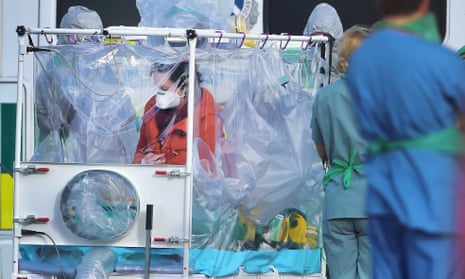Ebola survivors are continuing to suffer from neurological problems more than six months after infection, according to the early results of a new study.
The findings from research undertaken by US neurologists in Liberia appear to confirm suspicions that there are serious long-term effects of Ebola virus disease. They have been made public days after Pauline Cafferkey, the nurse who contracted Ebola while working as a volunteer in Sierra Leone, was admitted for the third time to the infectious diseases unit of the Royal Free hospital.
The study was carried out in Liberia by researchers from the US National Institute of Neurological Disorders and Stroke in Bethesda. A team of neurologists travelled to Liberia, where they recruited 87 survivors of the epidemic for a study on the long-term impact on the brain. Four were excluded because of other conditions. The remaining 82 were examined by the team and compared with close contacts who had not contracted the Ebola virus.
Most of the survivors had health issues and neurological damage of some kind. “While an end to the outbreak has been declared, these survivors are still struggling with long-term problems,” said Lauren Bowen, the study’s author.
The survivors had an average age of 35. The most common ongoing problems they experienced were weakness, headache, memory loss, depressed mood and muscle pain. Two people were suicidal and one had hallucinations.
Common neurological findings on examination included abnormal eye movements, tremors and abnormal reflexes. Their friends and relatives are also being examined to try to determine which of these findings are specifically related to Ebola virus infection.
“It is important for us to know how this virus may continue to affect the brain long term,” said Bowen. Her neurological study is part of a larger piece of research called Prevail III, which monitors Ebola survivors.
“More than 28,600 people were infected with Ebola in west Africa during the outbreak. Of that number, 11,300 died. In collaboration with the ongoing Prevail III natural history study of Ebola survivors, we wanted to find out more about possible continued long-term brain health problems for the more than 17,000 survivors of the infection.”
The full study will be presented to the American Academy of Neurology annual meeting in Vancouver in April.
Cafferkey, 40, who returned from working in the Kerry Town Ebola treatment unit in Sierra Leone, run by Save the Children, in December 2014, spent almost a month in isolation in the Royal Free in January 2015.
When she was discharged and returned to her home in Scotland, it was assumed that her problems were over, but last October she again fell ill. She was diagnosed with meningitis, triggered by the Ebola virus lingering in her nervous system. Again she was transferred to the Royal Free, where she came close to death but rallied and returned home.
She has now been admitted again “due to a late complication from her previous infection by the Ebola virus”, a Royal Free spokesperson said. Her condition is said to be stable.
